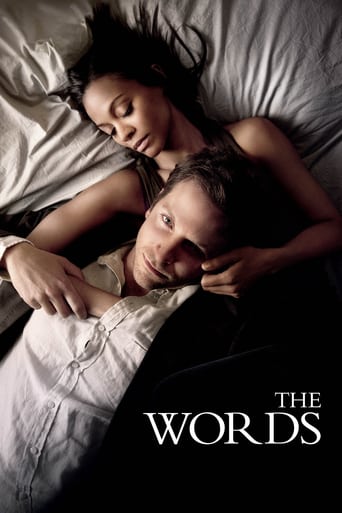Perry Kate
Very very predictable, including the post credit scene !!!
Sienna-Rose Mclaughlin
The movie really just wants to entertain people.
Phillipa
Strong acting helps the film overcome an uncertain premise and create characters that hold our attention absolutely.
Michael Ledo
The film has a lot of layers to it. Author Clay Hammond (Dennis Quaid) is reading from his novel, "The Words." The film then goes on about the novel of a struggling writer (Bradley Cooper) and his wife (Zoe Saldana). While the struggling writer is honeymooning in Paris he comes across an old novel which he passes off as his own. The novel is about an American in Paris at the end of WWII, which becomes a story within a story within the movie.As it turns out the author is still alive. As we glimpse back to the present, Clay Hammond is being seduced by a college student (Olivia Wilde) who is fascinated with his work.The movie attempts to deal with the guilt people feel for doing the wrong thing, then being unable to atone for it. Actions have consequences that sometimes cannot be made correct. Unfortunately the ending proved predictable for a fine story.Parental Guide: 8 F-bombs. No sex or nudity. Implied sex.
pranderson063095
The movie has not been received well by the critics. Not surprising at all. The public, on the other hand, likes the movie. This is a movie that tends to cause one to overthink it when it's structure is pretty obvious. This is where it falls apart. A story about an author who writes a story about and author who breaks the one rule no author should break when he steals the work of another unpublished author. Working backwards, the movie works until it fails to resolve the top level story. Leaving very obscure clues is not enough. Having a character without any connected background or confirmation of why they are in the story is the Missed it by "This Much." Open ended is fine but unresolved is not. Two of the three stories are profound but they rest on a shaky foundation that the viewer must now decide for themselves. "At some point, you have to choose between life and fiction. The two are very close, but they never actually touch." says Clay. Yes, we must decide whether it is life or fiction but, yes, the two do touch. Who is who is almost explained but not quite. The redemption which Rory seeks for his sins is obscure and the writers make it so because they do not want to be accused of being trite or cliche. Well in this one part, they are. The two inner stories would hold up just fine without the smoke that Daniella brings to the movie. In fact, remove all of the scenes in Clay's condo because they really do nothing for the story. It does nothing to conclude that Daniella's objective is to bed the famous author she has a crush on. We can be thankful that although she almost succeeds, she doesn't, at least not in this fiction. The critics who blast the movie because of its lack of literary acclaim are typical of critics who see only their version of the way things should be. Perhaps the fact that the final resolution is not so open-ended as it is simply confusing and leaves gaping holes in the story. We find 90% of the movie profound and enjoyable and actually very realistic. It's the 10% at the end in Clay's roost that we are left dangling without sufficient clue. The baseball is not enough.
alixke
It's funny because the film is a story about its story.
the german film "Lila, Lila (2009)" has exactly the same plot. But the cinematography and actors are better than in this one. So if you are hesitating I would watch the german version.
StrayKat
How can a man move forward when he stole something to gain approval from his wife? How does that affect the relationship, as well as his own identity and self-esteem? How can it be fixed? I loved that the questions were open-ended and unresolved in the movie, because those questions are unresolved in real life. And I thought it was interesting how the Old Man subtly cursed the young author. He said the young author couldn't fix his error, that when he stole the book, he took the pain with it. He was foretelling the pain that the author would have with his wife, how his stealing it would make him lose her just as the Old Man lose his own wife.I might be the only one who saw the metaphorical Biblical parallel in the movie, and it may not have been intended by the authors of the film, because I didn't see it mentioned anywhere else.I loved all of the layers of this movie. I think it was one of the best movies I've ever seen.

